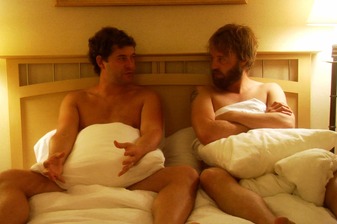There is plenty of nervous laughter for both the viewers and the cast of “Humpday,” a hilarious indie comedy about “two straight dudes who agree to bone each other. ”
Written and directed by Lynn Shelton, this remarkably perceptive film about masculinity and sexuality has two former college buddies — Ben (Mark Duplass) and Andrew (Joshua Leonard) — reuniting and agreeing to make a gay-porn film. Because they are both resolutely heterosexual, they feel their undertaking is not only “beyond gay,” but that it will be a work of art. Really.
Modestly made, “Humpday” is shot mainly with a handheld camera and features little background music — mostly when a radio is on in a particular scene. This casual but deliberately intimate style allows viewers the opportunity to listen to, observe and get to know these interesting characters.
Ben is married to Anna (Alycia Delmore), and they are trying to have a baby. Then, Andrew arrives unexpectedly and rings their doorbell at 1:30 in the morning, waking them. When he and Ben reunite, they can’t stop hugging and touching each other. They compare hair and body fat. It goes on perhaps a little too long, and the overly friendly nature of their antics is almost unsettling.
Whereas these guys once fancied themselves to be Sal and Dean from Kerouac’s “On the Road,” Ben has settled into conventional married life while Andrew is still full of wanderlust.
The next day, Andrew befriends Monica (director Shelton), who lives in a sexually fluid house where her girlfriend Lily (Trina Willard) allows her to have some “boy time” with Andrew. When Ben arrives, he is initially put off by the weird vibes, but is soon seduced by the liquor, drugs and free love. By the end of the night, he is making hotel reservations to create an “erotic art film” with Andrew and “express” his longtime love for his friend.
Of course, this “project” has the effect of getting both guys to test how well they know themselves and each other — and how far they are willing to go in the name of friendship. Andrew cannot quite believe the more conservative Ben is going to have sex with him and there is considerable debate — and laughs — as these guys get into an escalating pissing contest to see who is going to back down first.
Likewise, once they are in the hotel room, tension mounts to see which guy is going to make the first move. The rub here is how these two very competitive, very insecure men are daring each other to take things to the next level. Even on the basketball court, where a simple game becomes a wrestling match, Ben and Andrew are trying to one-up the other.
Does Ben have deep-seated homosexual feelings for his friend? Is Andrew mad at Ben because of something from their past? These are some of the questions Shelton shrewdly posits, and there are no easy or right answers.
Yet as “Humpday” finds drama in what is going on with the characters, there is plenty of humor in how their situation unfolds. Ben gets in trouble with the no-nonsense Anna because he is less than honest with her once Andrew arrives on the scene. He cannot admit his fear about having a baby when it is obvious that he is very much an adolescent himself. Her reactions to his behavior constantly surprise him, and many of the best jokes in the film stem from the couple’s interactions. Because the audience knows both characters’ perspectives, the humor is derived from scenes of Ben telling Anna less than the whole truth about his “project.”
Likewise, Andrew, who wishes he were “more gay,” is threatened by a dildo Monica and Lily plan to use when he participates in a threesome with them. If a fake penis in the room is a mood breaker, how is Andrew going to react to a real cock when he has to “perform” on camera the next day?
For all the polyamorous activity on display in “Humpday,” little of it is sexy and none of the characters is satisfied. The audience, however, will likely be chortling happily as Ben and Andrew are repeatedly emasculated by women and each other. What makes the film so clever is how these guys find a kind of enlightenment through their efforts to have this artistic same-sex experience.
The strong performances by the trio of leads contribute to the film’s success. Duplass, himself a filmmaker (“Baghead”), is fantastic as Ben, a man who allows his anxieties to prompt him to make rash and bad decisions. Duplass’ expressions are priceless, especially when he recounts a revealing story about his obsession with a video-store clerk. Furthermore, his foolish efforts at smooth talk are pricelessly funny.
Delmore is also terrific in her role: Her reactions to Ben and Andrew are spot-on. Anna exhibits intelligence, but there is no question why she loves Ben — even when he says and does dumb things that make her angry. Her performance anchors “Humpday” and gives audiences an identification point.
In the film’s most pivotal role of Andrew, Leonard is also perfectly cast. His goofy charm is just seductive and passive-aggressive enough that Ben falls in step with him. And viewers will too. A scene where he and Anna get drunk together is a highlight, but it is his last moment on screen that is the most haunting, and open to interpretation.
How viewers react to “Humpday” certainly depends on their own comfort level with the subject. Women and gay men will likely laugh at these straight guys behaving badly. Bisexuals and the polyamorous may have a more guarded opinion. Heterosexuals are sure to squirm. Such is the film’s brilliance: It will certainly provoke a response — be it laughter or annoyance — from everyone who sees it.

